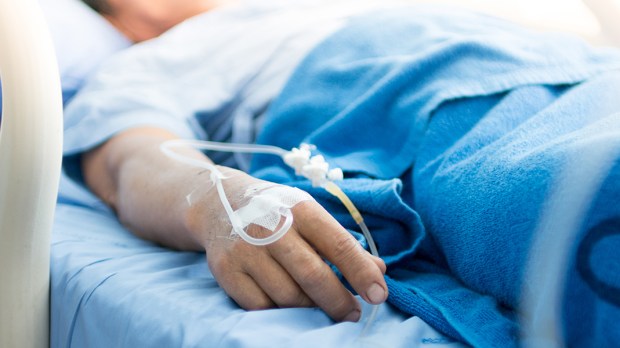In times of crisis, Christians and their families may find themselves faced with difficult end-of-life decisions.
This article is meant to provide practical guidance derived from and consistent with Catholic moral teaching for those who are dying, or are caring for someone who is dying.
Ordinary and Extraordinary Care
The most common set of questions at the end-of-life concerns what treatments—including life-sustaining treatments—should be accepted and which may be forgone.
I will set down the general ethical guidelines that are relevant to all particular “bedside” scenarios and then apply them to some common questions. The guidelines should be used to educate consciences, in discussions among family members and in consultations with doctors. They are not arbitrary rules set up by the Catholic Church. They embody moral truths to help guide good decision-making.
General ethical guidelines
If some treatment promises reasonable hope of benefit (i.e., is not futile) AND is not excessively burdensome, then I ought to accept it. Catholic moral teaching refers to this form of care as “ordinary” (also called “proportionate”). Ordinarily, I have an obligation to accept ordinary care.
If some treatment does not promise me reasonable hope of benefit (i.e., is futile) OR it is excessively burdensome to me, then I may forgo it. It is denoted “extraordinary” care (“disproportionate”). Ordinarily, I am not obligated to accept extraordinary care.
Questions and answers related to these guidelines
Who makes the decision as to whether a treatment offers reasonable hope of benefit?
— The patient. But to make a good decision as to whether some treatment offers promise, patients must consult as widely as possible the informed opinion of medical professionals.
Does the patient also decide the question of excessive burden?
— Yes. Patients may have different subjective standards as to what constitutes to them an excessive burden. If some treatment offers reasonable hope of benefit, but a patient finds the treatment greatly repugnant (say, a woman who’s been sexually abused as a child finds the thought of intubation intolerable), she may be encouraged to accept the treatment, but in the end, the decision is hers to make.
It is critical to remember here that the question being addressed here concerns whether the treatment is experienced as an excessive burden; we are not asking whether the patient feels his life is excessively burdensome. If he feels his life is a great burden, he needs assistance (perhaps psychological or pastoral care). But we don’t ask him if he wants that burden lifted; to do that would mean ending his life by assisted suicide or euthanasia.
When is it licit for me to ask my doctor to write me a DNR (“Do Not Attempt Resuscitation”)?
— I may request a DNR only under conditions in which I am certain that Catholic moral teachings do not require me to accept attempted resuscitation.
When does Catholic moral teaching require me to accept attempted resuscitation?
— When carrying out CPR on me would neither be futile nor excessively burdensome.
When should I accept intubation?
— Intubation is always ordinary care when it promises reasonable hope of benefit and is not excessively burdensome.
When may I forgo it?
— When it is futile or excessively burdensome.
When should I accept food and water, even if it needs to be medically administered?
— In March 2004, St. John Paul II taught
I should like to underline how the administration of food and water, even when provided by artificial means, always represents a natural means of preserving life, not a medical act. Its use, furthermore, should be considered, in principle, ordinary and proportionate, and as such morally obligatory, insofar as and until it is seen to have attained its proper finality, which in the present case consists in providing nourishment to the patient and alleviation of his suffering.
In other words, I should accept food and water, even if they need to be administered through a tube, whenever they will nourish my body and help sustain my life.
When may I refuse food and water?
— When they no longer provide me bodily nourishment. This can happen, for example, in the dying process when the body ceases to assimilate them.
When may I accept comfort measures only?
— I may forgo all forms of care, including food and water, only when all forms of treatment, including the administration of food and water, have become either futile or excessively burdensome, such as during the active dying process.
Is it ever licit to forgo medical care that is neither futile nor excessively burdensome?
— Although ordinarily I have an obligation to accept ordinary care, if resources become scarce, I may voluntarily forgo such care in order to allow another person to receive it. In this case, my renunciation is not, morally speaking, predicated on unreasonable refusal, but on love of neighbor.
Should I use a living will or other standard form advance decision documents, including POLST?
— I don’t recommend them. They tend to facilitate medically and morally irresponsible decision-making. The check-box format cannot take into consideration all the possible health contingencies that a person might face in the future. Family members and healthcare providers are thus left with the burden of interpreting the document in relation to situations never foreseen by the patient. These documents may hamstring doctors who should be given the freedom to help patients or their proxy make the best decisions in-the-moment of medical need to respond to the inherent particularities and complexities of each patient’s situation. Moreover, they may dictate immoral decisions by directing care-givers to withhold a treatment that may, in context, be ordinary.
Are there safer advance directive documents?
The safest type is called a Health Care Power of Attorney (HCPA) (also known as a Medical Durable Power of Attorney).You can prepare the document yourself.On it you appoint and authorize someone (your “proxy”) to make medical decisions on your behalf in the event you become incapacitated and unable to make them yourself.Your proxy can make all medical decisions for you, therefore there is no need for any living will type document.
How do I select a proxy?
— Appoint someone you trust to make decisions on the bases of Catholic moral teaching and your reasonable wishes.
Speak as extensively as possible with your proxy about your values and your wishes for care in typical end-of-life scenarios.
If your proxy does not know your wishes, then decisions should be made in accord with what he believes is best for you and pleasing to God.
No one should agree to act as proxy for a person who would expect them to disregard Catholic moral teaching in carrying out his wishes.
The website Powerofattorney.com offers free sample HCPOA templates for every US state.
What if I am resolute on using some form of an advance decision document?
— You are always free to change any document by adding or deleting items. You may attempt to bring it into conformity with Catholic moral principles in the following ways:
- add “treat orders” to the document: e.g., “administer all treatments that in the judgment of reliable physicians are not futile.”
- clarify withdrawal orders: e.g., “in the case of a terminal and irreversible illness, remove or withhold all medical treatments, including life-sustaining treatments, that are rightly judged to be extraordinary and disproportionate.”
- specify moral non-negotiables: e.g., “provide food and water so long as they are capable of sustaining my bodily life. If my body ceases to accept them, they should be removed.”
- add necessary caveats: e.g., a woman with morbid fear of intubation: “in the case of the need to intubate, withhold all intubation except for brief periods and only while I am unconscious.”

Read more:
Euthanasia isn’t about being free; it’s about being reduced to a dollar sign, says Pope Francis

